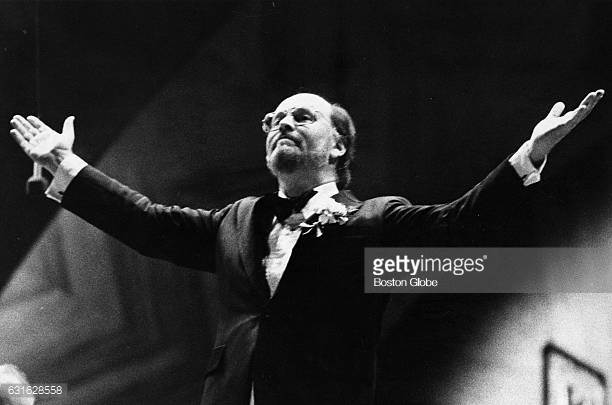-
Posts
4,765 -
Joined
-
Days Won
6
Everything posted by SteveMc
-
Man, very rough to watch.
-

John Williams Returns to the Hollywood Bowl, Sept. 3, 4 & 5, 2021
SteveMc replied to Ricard's topic in JOHN WILLIAMS
A wonderful experience of a lifetime it was for me. Still processing it, can't quite believe it. I saw John Williams at the Hollywood Bowl! I love how in tune the orchestra was with JW on selections like Olympic Fanfare and The BFG. It's like, David Newman is a very competent conductor, and the orchestra sounded great under his baton (especially Sabrina, which is a lovely score to hear live), but when John got warmed up, it was just electric. There were moments where you felt he was getting exactly what he wanted, just the right balance during the high points of the Olympic Fanfare, clarity in the rapid intricate wind passages in The BFG (it was astonishing to see how vigorous he got at that point), and the rousing and precise end to Adventures of Han. I love how he seemed to want the audience to really like BFG, he appears proud of the work. Of course the encores were incredible. The music itself was very familiar, but the way he drew on the crowd's excitement and love and infused that energy into the orchestra was just thrilling to be part of. -

John Williams Returns to the Hollywood Bowl, Sept. 3, 4 & 5, 2021
SteveMc replied to Ricard's topic in JOHN WILLIAMS
That golf thing he did with the lightsaber was great. -

John Williams Returns to the Hollywood Bowl, Sept. 3, 4 & 5, 2021
SteveMc replied to Ricard's topic in JOHN WILLIAMS
Alas no -

John Williams Returns to the Hollywood Bowl, Sept. 3, 4 & 5, 2021
SteveMc replied to Ricard's topic in JOHN WILLIAMS
All still coming! -

John Williams Returns to the Hollywood Bowl, Sept. 3, 4 & 5, 2021
SteveMc replied to Ricard's topic in JOHN WILLIAMS
Edit I made it! -

John Williams Returns to the Hollywood Bowl, Sept. 3, 4 & 5, 2021
SteveMc replied to Ricard's topic in JOHN WILLIAMS
Public transit is a nightmare today. I left campus at 3:20 and still might be late. -

John Williams Returns to the Hollywood Bowl, Sept. 3, 4 & 5, 2021
SteveMc replied to Ricard's topic in JOHN WILLIAMS
Around what time did the concert end? Hope I can catch an Uber back home tonight. -

John Williams Returns to the Hollywood Bowl, Sept. 3, 4 & 5, 2021
SteveMc replied to Ricard's topic in JOHN WILLIAMS
So, it turns out I am going Saturday, not Friday. Mixed up the dates, thought Sep. 4 was a Friday. Oops! -

The John Williams Concert Work Listening and Discussion Thread
SteveMc replied to SteveMc's topic in JOHN WILLIAMS
Sound The Bells (1993) The theme of JW composing for royalty continues. Sound The Bells is a sparkling occasional piece written as a gift for the wedding of Crown Prince Naruhito and Masako Owada. The Boston Pops was touring Japan at the time. Originally, the work was for brass and percussion, but a fuller arrangement was crafted and appears on the American Journey album. The joyous fanfare motif blends very nicely with the flowing melodic theme. There are echoes of Jurassic Park here, but the mood is much more definite, with no dark happenings on the horizon. I like it a lot. -

The John Williams Concert Work Listening and Discussion Thread
SteveMc replied to SteveMc's topic in JOHN WILLIAMS
Just a quick apology for falling behind schedule here. I'll make a stronger effort to be more consistent starting this evening. -

John Williams Returns to the Hollywood Bowl, Sept. 3, 4 & 5, 2021
SteveMc replied to Ricard's topic in JOHN WILLIAMS
I'll be at the Friday show! I guess whoever of us is there on Friday can just meet up briefly at the Bowl or just outside and say hello. Unless someone has ideas for something more formal. -

The John Williams Concert Work Listening and Discussion Thread
SteveMc replied to SteveMc's topic in JOHN WILLIAMS
Aloft...To the Royal Masthead! The UKs Prince Phillip visited Boston in 1992, and who else to herald the royal arrival but John Williams with a short fanfare that some have noted shares a bit of similarity with material in Jurassic Park. It is more celebratory and brilliant than stately and reverent. I like it. -
It's pretty cool. Fits in well with some of his many other little orchestral concert overtures.
-

The John Williams Concert Work Listening and Discussion Thread
SteveMc replied to SteveMc's topic in JOHN WILLIAMS
Clarinet Concerto (1991) Written for LA Philharmonic clarinet principal Michele Zukovsky, John Williams's Clarinet Concerto marks what I find a starting point of a rather consistent string of concerti by the composer. Prior to this, he had written only three in three decades. From this point onwards Williams would express himself regularly in the medium. Of all these concerti from what I call the "Reflective" period onwards, the Clarinet Concerto may just be the most obscure. It has never received a fully proper recording/release to my knowledge. The release that is available is a live recording of questionable (read: pretty bad) quality. Zukovsky seems to have exclusive rights to the piece, but on a woodwind board it is noted that the piece's obscurity has less to do with her and more to do with Williams being strongly (though perhaps recently less strongly) unsatisfied with the work and wishing it remain in the shadows, so to speak. It has not been published in score form either, though some sheets may be out there. A clarinetist on the aforementioned board claims to have studied it and noted that it is a very difficult piece for the soloist. The work is in three movements and is perhaps one of the more tonal and filmic of Williams's concerti, though still with the modernist bent that characterizes most of them. The first movement, Maestoso or Aria, has the sort of expected JW opening concerto movement structure, with distinct opening, buildup towards a climax, and then cadenza and quiet coda. The opening is characterized by a measured dissonance, the most modern sounding material in the piece, which soon leads to lyrical thematic material. This is followed by some lively passages that offer some wonderful interplay between soloist and orchestra. The climax marks a return of the lyrical material, followed by more of the interplay that dissolves into the engaging cadenza and concluding coda. The second movement Calmo or Elegy is a strongly structured delicate part that really is quite beautiful, lackluster recording notwithstanding. It begins with a nocturnal type episode with touches of mystery and longing. The second episode is more broadly lyrical, though still with some uncertainty of feeling that comes to the fore in some quicker virtuosic passages Then, a solo horn arrives and the mood turns nocturnal again, anticipating the Horn Concerto. Tension builds, and the strings herald a new more dissonant episode. The piece concludes with a return to the more lyrical mood, this time with a certain urgency. The third movement, Con Brio or Burlesque is broad fun. The most filmic movement, it calls to mind the strains of adventure and motion in Williams's action and scherzo writing for his scores. The tone is often cheeky and the writing for soloist virtuosic. The orchestra, especially the brass, get a chance to shine as well. This movement has the potential to be a real crowd pleaser. It is thematic and full of vibrant interplay. It sounds a lot like what a lot of folks want John's concert music to sound like. The rest of the work comes pretty close to that. I do hope this piece gets out of the shadows. I think it can quite readily enter the repertoire both as a challenge for soloist and as a drawer of crowds when it is on the program. Here is a link to purchase in the best (admittedly still quite lacking) quality we seem to have of the piece. The version on Spotify is unlistenable, imo. https://www.amazon.com/Williams-Clarinet-Concerto-Michele-Zukovsky/dp/B004HQTBIK/ref=sr_1_2?dchild=1&keywords=clarinet+concerto+williams&qid=1629524264&sr=8-2 -

What Is The Last Score You Listened To? (older scores)
SteveMc replied to Ollie's topic in General Discussion
The movie is tripe, but that should not cloud judgements of the score. -

The John Williams Concert Work Listening and Discussion Thread
SteveMc replied to SteveMc's topic in JOHN WILLIAMS
Celebrate Discovery (1990) Finally back on track now after my move. This concert overture was written to celebrate Christopher Columbus's "discovery" of America. It is an example of the precise, measured writing and orchestration characteristic of this era in Williams's stylistic evolution. There is a definite feel of unity here, it is a fine piece, even if it does not break so much new compositional ground. Indeed, I rather like the classicist nature of the themes. -

What Is The Last Score You Listened To? (older scores)
SteveMc replied to Ollie's topic in General Discussion
For me, it sounds more like a master using his well honed skills than a composer on autopilot. Yes, this. -

What Is The Last Score You Listened To? (older scores)
SteveMc replied to Ollie's topic in General Discussion
The Book Thief is one of the best thematically structured Williams scores in recent decades. It is a brilliant score. Perhaps the construction of the OST does not bring that out fully, a chronological treatment might help. Each cue is wonderfully constructed on its own and within the narrative structure -

What Is The Last Score You Listened To? (older scores)
SteveMc replied to Ollie's topic in General Discussion
Stepmom is nice. -

Hook - 30th Anniversary Double Vinyl from Mondo Records 2021
SteveMc replied to Jay's topic in JOHN WILLIAMS
-

Tanglewood 2021 season includes several Williams concerts
SteveMc replied to Miguel Andrade's topic in JOHN WILLIAMS
-

What Is The Last Film You Watched? (Older Films)
SteveMc replied to Mr. Breathmask's topic in General Discussion
Unless you are a genius, it comes off as self-indulgent and rootless. TBH, Scorsese is hit and miss for me when he tries for that sort of thing.




